Overview
The best foods to eat for gestational diabetes include whole grains, non-starchy vegetables, lean proteins, healthy fats, and berries, as these choices help regulate blood sugar levels and support overall health during pregnancy. The article emphasizes that a balanced diet incorporating these foods is essential for managing glucose levels effectively, as well as promoting fetal development and maternal well-being.
Introduction
The rise of gestational diabetes presents a significant challenge for many expectant mothers, with recent statistics indicating an increase in diagnoses from 6.0% in 2016 to 8.3% in 2021. This condition, characterized by the body's inability to produce enough insulin during pregnancy, often resolves after childbirth but requires careful management to ensure the health of both mother and child.
Understanding the dietary implications is crucial, as nutrition plays a pivotal role in controlling blood sugar levels. A well-balanced diet, composed of:
- Complex carbohydrates
- Lean proteins
- Healthy fats
can significantly impact glucose management and overall well-being. This article delves into essential dietary strategies, including foods to embrace and those to avoid, providing practical meal planning tips and healthy snack ideas tailored for women navigating gestational diabetes.
Understanding Gestational Diabetes and Its Dietary Implications
Gestational diabetes is a type of diabetes that emerges during pregnancy and typically resolves postpartum. It occurs when the body struggles to produce sufficient insulin to manage sugar levels effectively. Recent statistics indicate a concerning rise in gestational diabetes diagnosis, with the percentage of mothers affected increasing from 6.0% in 2016 to 8.3% in 2021, as noted by expert Joyce A. Martin.
Furthermore, the age-adjusted prevalence of diagnosed diabetes has escalated from 5.9% in 1999–2000 to 10.1% in August 2021–August 2023, highlighting the growing concern surrounding diabetes overall. This underscores the critical nature of understanding the best foods to eat for gestational diabetes for women diagnosed with this condition. Proper nutrition, including the best foods to eat for gestational diabetes, is essential as it has a direct impact on glucose control.
A balanced diet that features the best foods to eat for gestational diabetes, including:
- Complex carbohydrates
- Fiber
- Lean proteins
- Healthy fats
is essential. Furthermore, regular glucose monitoring is essential to ensure optimal well-being for both mother and fetus. T2DSolutions is committed to empowering diabetes management through education and community support, providing newly diagnosed patients with comprehensive resources such as personalized meal plans, educational webinars, and access to support groups.
They also provide innovative perspectives on managing gestational diabetes, including the best foods to eat for gestational diabetes, as well as the latest research and strategies for effective glucose management. To learn more about these valuable resources and how they can assist you, we encourage you to explore T2DSolutions' offerings for managing gestational diabetes and take proactive steps toward your health and well-being.
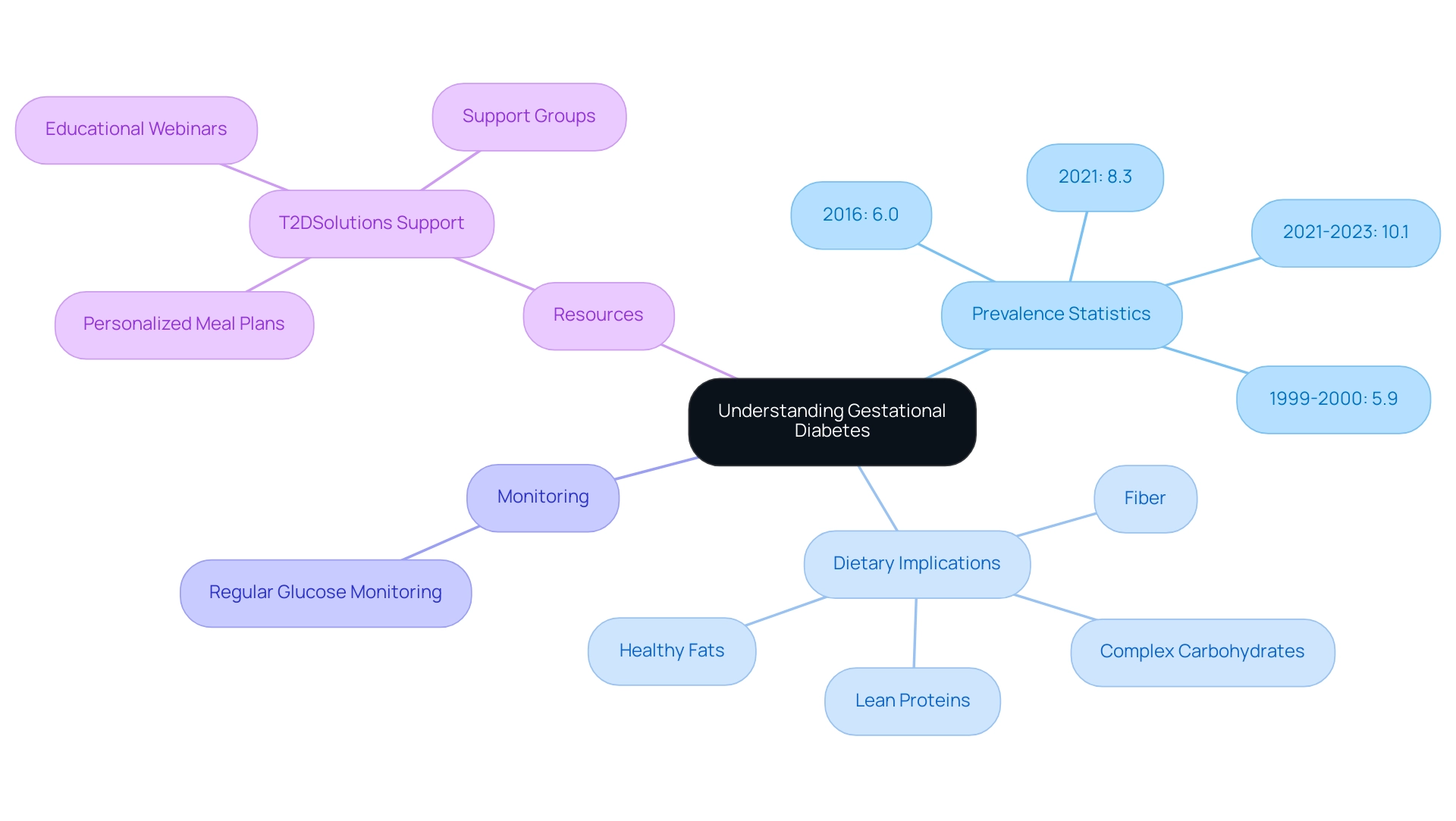
Top Foods to Include in a Gestational Diabetes Diet
Including the best foods to eat for gestational diabetes in a meal plan can greatly help in keeping stable glucose levels. Here are ten essential foods to consider:
-
Whole Grains: Options such as quinoa, brown rice, and whole-grain bread are not only rich in fiber but also play a crucial role in regulating sugar levels.
Expert dietitians emphasize that whole grains can enhance insulin sensitivity and improve overall metabolic health. It's important to note that in the top decile of maternal refined-grain intake, the risk ratio for overweight or obesity was found to be 2.60, highlighting the need for careful dietary choices during pregnancy. -
Non-Starchy Vegetables: Leafy greens, broccoli, and bell peppers offer low-calorie, low-carbohydrate choices that are perfect for snacks and meals.
Their high fiber content contributes to better glucose control, which is why they are considered some of the best foods to eat for gestational diabetes. -
Lean Sources: Options like chicken, turkey, fish, and plant-based alternatives such as beans and lentils provide essential nutrients without causing blood sugar spikes.
These proteins are essential for preserving muscle mass and overall well-being during pregnancy. -
Healthy Fats: Foods such as avocados, nuts, and olive oil not only support overall health but also contribute to feelings of fullness, helping to prevent overeating.
Healthy fats are important for fetal development as well. -
Berries: Strawberries, blueberries, and raspberries have a lower carbohydrate content compared to many other fruits and are rich in antioxidants.
Their natural sweetness, along with high fiber content, makes them a delightful option that assists in regulating glucose levels. -
Greek Yogurt: This dairy product is an excellent source of essential nutrients and probiotics, which can promote digestive health.
Nutrition specialists suggest that one of the best foods to eat for gestational diabetes is Greek yogurt, as it has filling qualities and can help support stable glucose levels. -
Legumes: Beans and lentils are high in both fiber and nutrients, making them fantastic additions to meals.
Their intricate carbohydrates break down gradually, which aids in keeping stable glucose levels and promotes heart wellness. -
Eggs: A versatile source of nutrition, eggs can be prepared in various ways to suit individual tastes.
They offer vital amino acids and have been demonstrated to help in stabilizing glucose levels when incorporated into a balanced diet. -
Cottage Cheese: Low-fat cottage cheese is a great option for protein and calcium but is low in carbohydrates.
This makes it an ideal snack that supports blood sugar control while providing essential nutrients for both mother and baby. -
Cinnamon: Known for its flavorful addition to many dishes, cinnamon may also improve insulin sensitivity.
This spice can be easily integrated into different dishes and snacks, enhancing both flavor and possible wellness advantages.
Studies have indicated that a well-rounded diet, which includes the best foods to eat for gestational diabetes, not only promotes maternal well-being but also positively affects child development.
In a follow-up study on child well-being and development, significant correlations were found between early dietary habits and later outcomes, emphasizing the importance of maternal nutrition during pregnancy for child development.
As one dietitian noted, 'The foods you choose during pregnancy can have lasting effects on your child's health, making it crucial to prioritize nutritional quality.
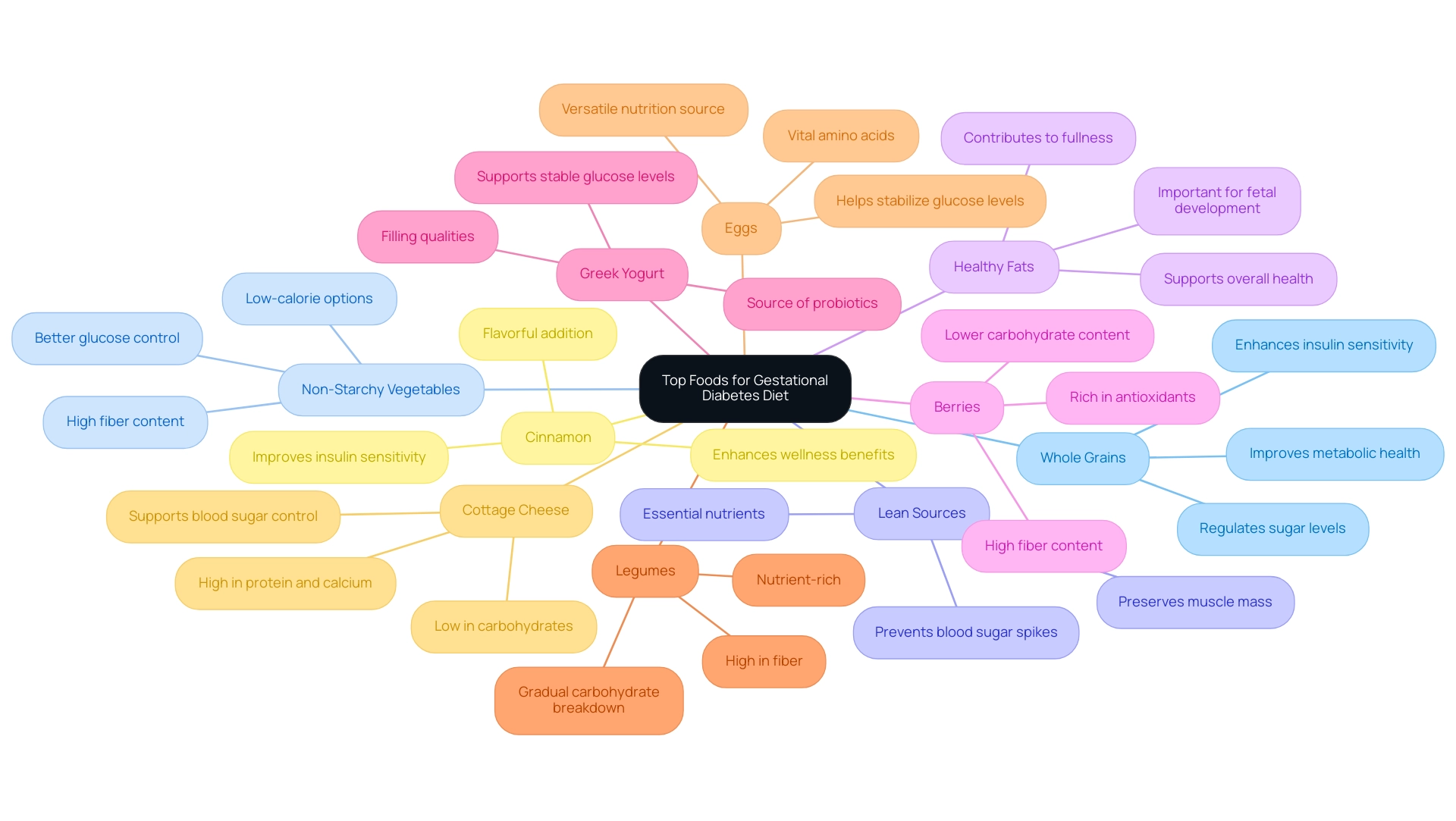
Foods to Avoid for Better Blood Sugar Control
Successfully handling gestational diabetes (GDM) requires meticulous dietary selections, including the best foods to eat for gestational diabetes, while excluding specific foods that can greatly affect glucose levels. Here are key categories of foods to avoid:
- Sugary Beverages: Drinks such as sodas, fruit juices, and sweetened teas are notorious for causing rapid spikes in glucose levels, making them detrimental for GDM management.
- Refined Carbohydrates: Items like white bread, pastries, and most processed snacks are low in fiber and can lead to elevated blood glucose. These carbohydrates are quickly digested, resulting in sharp glucose surges.
- High-Sweet Fruits: While fruits are generally a nutritious option, specific kinds—like bananas and grapes—are particularly rich in natural sweetness. These should be consumed in moderation to prevent excessive sugar intake.
- Full-Fat Dairy Products: High in saturated fats, full-fat dairy can be less than ideal for cardiovascular well-being during pregnancy. Choosing low-fat or fat-free options may be a better decision for managing overall well-being and glucose levels.
- Fried Foods: Foods that are fried are typically high in unhealthy fats and calories, which can contribute to weight gain and lead to spikes in glucose levels.
- Processed Meats: Products like hot dogs and deli meats frequently include unhealthy preservatives and fats, which can negatively impact both general health and glucose management.
- White Rice and Pasta: These refined grains are swiftly transformed into glucose, leading to spikes in circulation levels. Whole grains, in contrast, are recommended due to their higher fiber content and slower digestion.
- Sweet Treats: Cakes, cookies, and candy are high in sweetness and should be limited. Their consumption can lead to immediate increases in glucose levels.
- High-Calorie Snacks: Processed snacks such as chips can result in overeating, making it challenging to keep stable glucose levels. Choosing healthier snack options is advisable.
- Alcohol: Alcohol intake should be avoided entirely, as it can significantly affect glucose levels and overall health during pregnancy.
Understanding the implications of these dietary restrictions is crucial for managing GDM effectively, especially when considering the best foods to eat for gestational diabetes. Recent studies indicate that developing tailored nutrition plans that incorporate the best foods to eat for gestational diabetes, in collaboration with dieticians, can greatly benefit women with GDM, enhancing both maternal and neonatal outcomes. For instance, a review of 16 RCTs involving 841 women with GDM showed that modified dietary interventions were associated with lower infant birth weight.
Additionally, healthcare professionals stress the importance of individualized approaches, as conflicting evidence exists regarding supplements, such as fish oil, during pregnancy. Notably, a recent RCT indicated that a soy protein-rich diet reduced the need for exogenous insulin in women with GDM. Furthermore, in a randomized crossover study, Rasmussen et al. demonstrated that a diet with a high carbohydrate intake in the morning resulted in significantly lower mean glucose and fasting glucose levels compared to a low carbohydrate intake. Overall, awareness and proactive dietary management are essential elements in attaining optimal glucose regulation during this critical period.
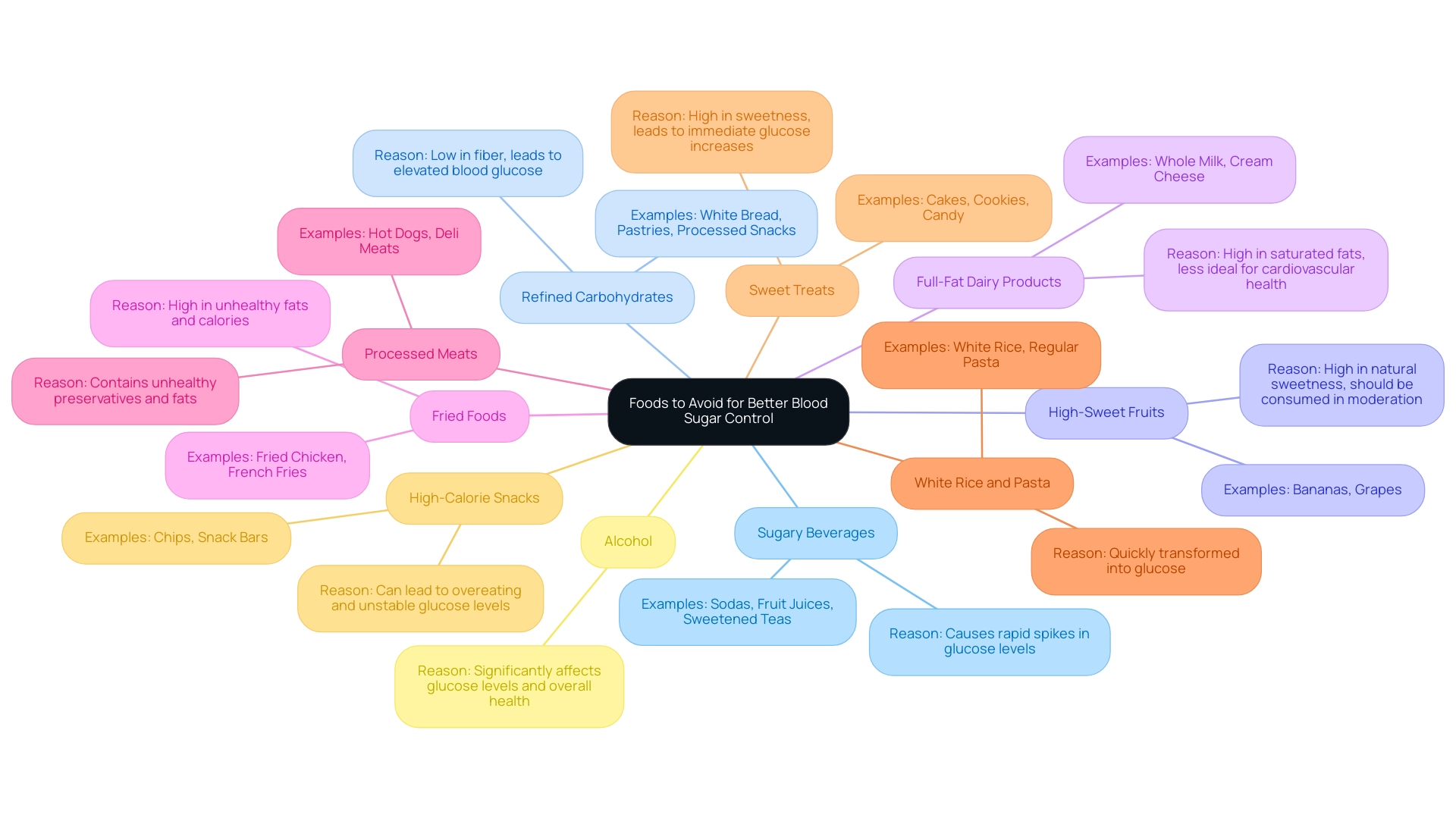
Meal Planning and Portion Control Strategies
Effective meal planning and portion control are crucial strategies in managing gestational diabetes, especially when selecting the best foods to eat for gestational diabetes. Here are some essential tips to help navigate your dietary needs during pregnancy:
-
Plan Meals Ahead: Allocate time each week for meal planning.
This ensures a balanced consumption of carbohydrates, nutrients, and fats, which are considered some of the best foods to eat for gestational diabetes, essential for glucose regulation. Studies show that exercise interventions of 20–50 minutes per day, 2–7 days a week can lead to improvements in glucose outcomes, reinforcing the importance of a structured approach to diet and activity.
-
Apply the Plate Method: A practical approach is to fill half your plate with non-starchy vegetables, allocate a quarter for lean protein, and reserve the final quarter for whole grains.
This method promotes balanced meals and helps regulate portion sizes.
-
Control Portions: Utilize measuring cups or a food scale to accurately gauge serving sizes, particularly for carbohydrates.
Consistent portion control is among the best foods to eat for gestational diabetes, as it can lead to better glucose outcomes.
-
Prepare Healthy Snacks: Keep nutritious snacks readily available to curb hunger and prevent unhealthy eating choices.
Pre-portioned snacks can make it easier to stick to your dietary goals, including the best foods to eat for gestational diabetes.
-
Monitor Glucose Levels: Regularly tracking how different foods and portions affect your glucose is essential for making informed dietary adjustments.
This practice facilitates a better understanding of your body’s responses, especially regarding the best foods to eat for gestational diabetes.
-
Stay Hydrated: Keeping sufficient fluid intake during the day promotes overall well-being and can assist in glucose regulation, which is important when selecting the best foods to eat for gestational diabetes.
-
Incorporate Variety: Rotating your food choices ensures a broad range of nutrients and keeps meals engaging.
Incorporating the best foods to eat for gestational diabetes into a diverse diet can enhance satisfaction and adherence to your meal plan, while also considering weight gain recommendations during pregnancy that vary based on pre-pregnancy BMI. This personalized guidance can significantly impact your overall health and management of gestational diabetes.
Dr. Theodore J. Krum, a seasoned obstetrician and gynecologist, highlights the significance of customized nutritional guidance:
You can rely on us to regularly check your glucose levels and assist you with a balanced diet suited to your requirements during pregnancy.
Furthermore, a systematic review has shown that vitamin D deficiency is linked to a 26% increased risk of gestational diabetes, and higher daily doses of vitamin D (over 2,000 IU) appear to significantly reduce this risk.
This highlights the importance of nutritional considerations beyond just meal planning and portion control.
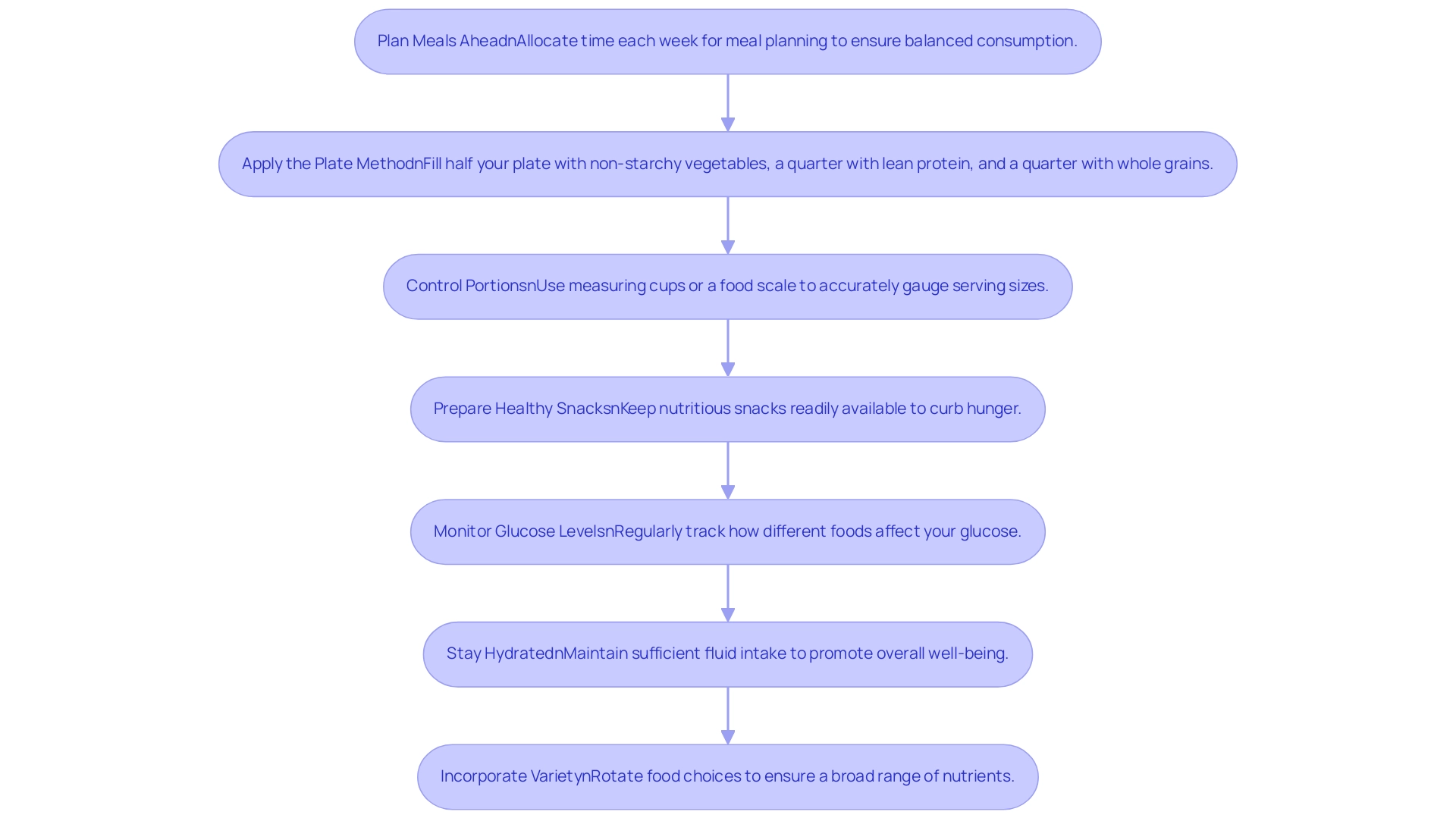
Healthy Snack Ideas for Gestational Diabetes
Managing gestational diabetes effectively involves making mindful choices and focusing on the best foods to eat for gestational diabetes, particularly when it comes to snacking. Women who are overweight have a higher risk of developing gestational diabetes, making healthy snacking even more crucial. Here are several healthy snack ideas that can support sugar control:
- Apple Slices with Almond Butter: This combination offers a balance of fiber from the apple and healthy fats from the almond butter, which can help maintain stable energy levels.
- Carrot Sticks and Hummus: A crunchy and satisfying option that offers essential nutrients and fiber, making it a nutritious choice for those managing their blood sugar.
- Greek Yogurt with Berries: Rich in nutrients and packed with antioxidants, this snack also includes fiber from berries, supporting digestive health.
- Celery with Peanut Butter: This crunchy snack is not only filling but also delivers a good mix of nutrients, contributing to a balanced diet.
- Hard-Boiled Eggs: A convenient source of nourishment that can be prepared ahead of time, hard-boiled eggs offer essential nutrients to keep hunger at bay.
- Mixed Nuts: A small handful of unsalted nuts provides healthy fats and essential nutrients, supporting heart health and satiety.
- Cottage Cheese with Pineapple: This snack blends the nutritional advantages of cottage cheese with the natural sweetness of pineapple, making it a balanced choice. It’s advisable to use pasteurized cottage cheese to ensure safety and convenience. This corresponds with the case study that emphasizes cottage cheese as a beneficial source of nutrients and calcium, particularly when combined with fruits for a simple snack.
- Whole Grain Crackers with Cheese: This satisfying combination provides fiber from the crackers and nutrients from the cheese, making it a great option for a quick snack.
- Chia Seed Pudding: Prepare this simple pudding ahead of time for a snack high in fiber and nutritious fats, which can assist in glucose regulation.
- Smoothies: A mixture of spinach, protein powder, and unsweetened almond milk forms a nutritious choice that can offer essential vitamins and minerals.
Additionally, when considering packaged snacks such as protein bars, aim for those with less than 15g of sweeteners per 100g to maintain healthy blood glucose levels. Imashi Fernando, MS, RDN, CDCES, emphasizes,
With any form of diabetes, you should keep foods that are high in added sugars and refined carbs to a minimum,
reinforcing the importance of healthy snacking. Incorporating these snack ideas can help manage gestational diabetes and are considered some of the best foods to eat for gestational diabetes while providing essential nutrients.
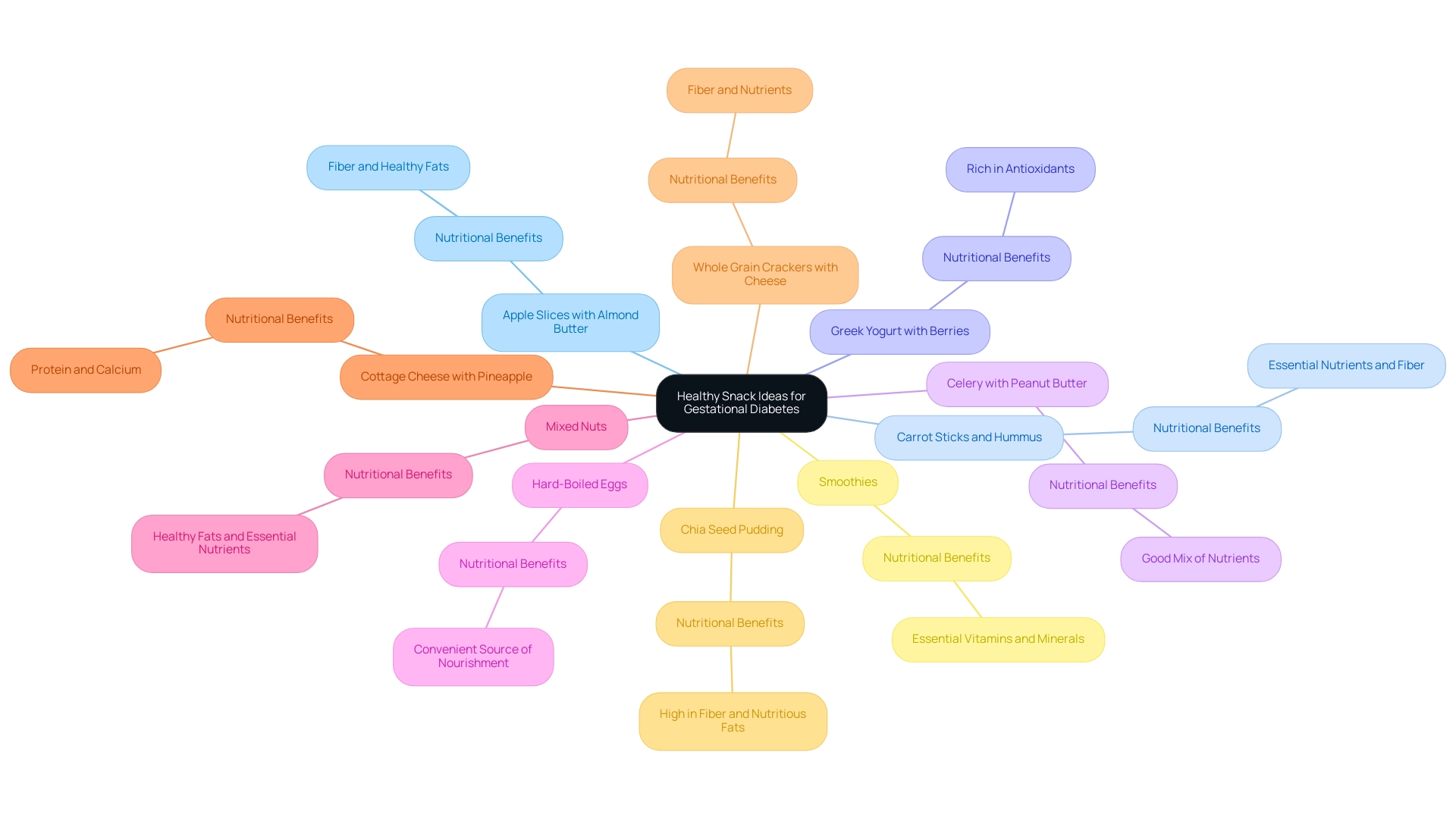
Conclusion
Managing gestational diabetes is a critical aspect of ensuring the health and well-being of both mother and child. As outlined, the rise in diagnoses highlights the importance of understanding dietary implications and making informed food choices. A balanced diet that emphasizes complex carbohydrates, lean proteins, and healthy fats can significantly aid in blood sugar management, while regular monitoring is essential for optimal outcomes.
Incorporating nutrient-dense foods such as:
- Whole grains
- Non-starchy vegetables
- Lean proteins
is crucial, while avoiding:
- Sugary beverages
- Refined carbohydrates
- High-sugar fruits
can help mitigate blood sugar spikes. Meal planning and portion control further enhance dietary management, providing a structured approach that supports both nutritional needs and blood sugar stability.
Healthy snacking also plays a vital role in managing gestational diabetes. Choosing snacks that combine fiber, protein, and healthy fats can prevent unhealthy cravings and stabilize energy levels. The strategies and food recommendations provided serve as a comprehensive guide for expectant mothers navigating this condition.
Ultimately, proactive dietary management not only supports maternal health but also lays the foundation for positive child development. With careful planning and informed choices, women can effectively manage gestational diabetes and promote a healthier pregnancy experience.



